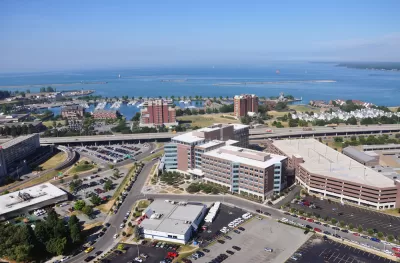Buffalo is considering policies to support affordable rental housing as demand rises. While inclusionary zoning is controversial everywhere, specific questions about the policy's effectiveness arise in cities with little to no population growth.

"While $2,000-a-month apartments with granite countertops, high ceilings and in-building gymnasiums attract millennials to downtown Buffalo, demand for government-subsidized, low-income rental housing also seems to be growing," writes Susan Schulman.
The headline focuses on what Schulman describes as "the other side of Buffalo's rental housing boom." The trend is visible after a series of large low-income have come online in the city and been immediately occupied by renters. As for why there's new demand for low-income rental housing, Schulman writes: " One reason is that Buffalo’s low-income population has inched up in recent years, census data shows. Plus rents are increasing, often beyond inflation, sometimes reflecting rising real estate values when buildings are sold," and "[t]he result is that more lower-income people in Buffalo – which has a $31,918 median household income – are being priced out of market-rate housing, increasing demand for government-subsidized."
In the face of the growing pressure, local politicians are considering inclusionary zoning. "The Buffalo Common Council seems eager to enact such a law, while Mayor Byron W. Brown appears to be seeking middle ground," reports Schulman. The article includes a thorough discussion of whether inclusionary zoning works in cities where the population is relatively flat and rents are rising at a relatively low rate. Other "Rust Belt" cities, like Detroit and Pittsburgh," are also considering inclusionary zoning, writes Schulman.
FULL STORY: The other side of Buffalo's rental boom? Not enough low-income apartments

Planetizen Federal Action Tracker
A weekly monitor of how Trump’s orders and actions are impacting planners and planning in America.

Maui's Vacation Rental Debate Turns Ugly
Verbal attacks, misinformation campaigns and fistfights plague a high-stakes debate to convert thousands of vacation rentals into long-term housing.

San Francisco Suspends Traffic Calming Amidst Record Deaths
Citing “a challenging fiscal landscape,” the city will cease the program on the heels of 42 traffic deaths, including 24 pedestrians.

Defunct Pittsburgh Power Plant to Become Residential Tower
A decommissioned steam heat plant will be redeveloped into almost 100 affordable housing units.

Trump Prompts Restructuring of Transportation Research Board in “Unprecedented Overreach”
The TRB has eliminated more than half of its committees including those focused on climate, equity, and cities.

Amtrak Rolls Out New Orleans to Alabama “Mardi Gras” Train
The new service will operate morning and evening departures between Mobile and New Orleans.
Urban Design for Planners 1: Software Tools
This six-course series explores essential urban design concepts using open source software and equips planners with the tools they need to participate fully in the urban design process.
Planning for Universal Design
Learn the tools for implementing Universal Design in planning regulations.
Heyer Gruel & Associates PA
JM Goldson LLC
Custer County Colorado
City of Camden Redevelopment Agency
City of Astoria
Transportation Research & Education Center (TREC) at Portland State University
Jefferson Parish Government
Camden Redevelopment Agency
City of Claremont




























